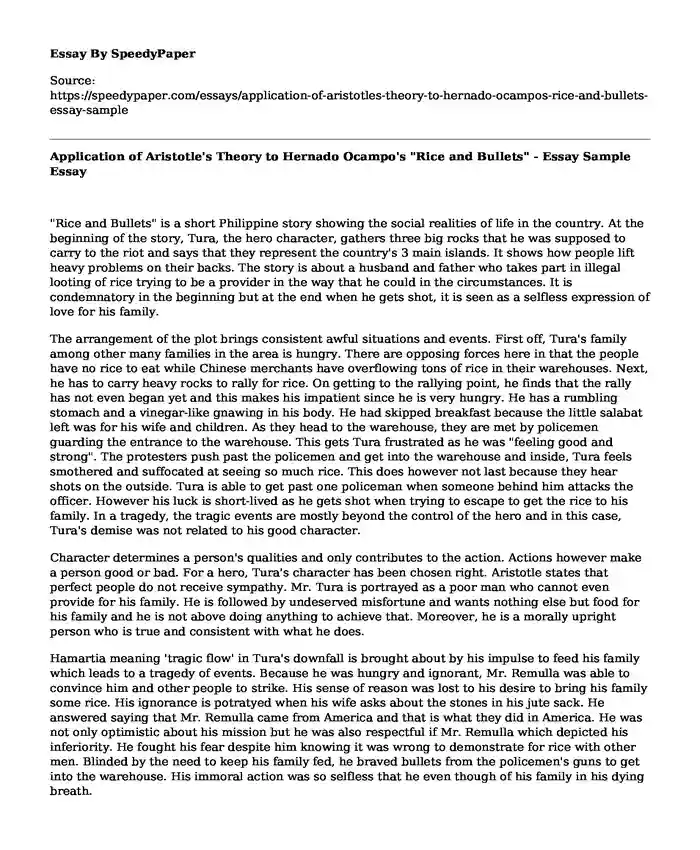
| Type of paper: | Essay |
| Categories: | Philosophy World literature |
| Pages: | 4 |
| Wordcount: | 839 words |
"Rice and Bullets" is a short Philippine story showing the social realities of life in the country. At the beginning of the story, Tura, the hero character, gathers three big rocks that he was supposed to carry to the riot and says that they represent the country's 3 main islands. It shows how people lift heavy problems on their backs. The story is about a husband and father who takes part in illegal looting of rice trying to be a provider in the way that he could in the circumstances. It is condemnatory in the beginning but at the end when he gets shot, it is seen as a selfless expression of love for his family.
The arrangement of the plot brings consistent awful situations and events. First off, Tura's family among other many families in the area is hungry. There are opposing forces here in that the people have no rice to eat while Chinese merchants have overflowing tons of rice in their warehouses. Next, he has to carry heavy rocks to rally for rice. On getting to the rallying point, he finds that the rally has not even began yet and this makes his impatient since he is very hungry. He has a rumbling stomach and a vinegar-like gnawing in his body. He had skipped breakfast because the little salabat left was for his wife and children. As they head to the warehouse, they are met by policemen guarding the entrance to the warehouse. This gets Tura frustrated as he was "feeling good and strong". The protesters push past the policemen and get into the warehouse and inside, Tura feels smothered and suffocated at seeing so much rice. This does however not last because they hear shots on the outside. Tura is able to get past one policeman when someone behind him attacks the officer. However his luck is short-lived as he gets shot when trying to escape to get the rice to his family. In a tragedy, the tragic events are mostly beyond the control of the hero and in this case, Tura's demise was not related to his good character.
Character determines a person's qualities and only contributes to the action. Actions however make a person good or bad. For a hero, Tura's character has been chosen right. Aristotle states that perfect people do not receive sympathy. Mr. Tura is portrayed as a poor man who cannot even provide for his family. He is followed by undeserved misfortune and wants nothing else but food for his family and he is not above doing anything to achieve that. Moreover, he is a morally upright person who is true and consistent with what he does.
Hamartia meaning 'tragic flow' in Tura's downfall is brought about by his impulse to feed his family which leads to a tragedy of events. Because he was hungry and ignorant, Mr. Remulla was able to convince him and other people to strike. His sense of reason was lost to his desire to bring his family some rice. His ignorance is potratyed when his wife asks about the stones in his jute sack. He answered saying that Mr. Remulla came from America and that is what they did in America. He was not only optimistic about his mission but he was also respectful if Mr. Remulla which depicted his inferiority. He fought his fear despite him knowing it was wrong to demonstrate for rice with other men. Blinded by the need to keep his family fed, he braved bullets from the policemen's guns to get into the warehouse. His immoral action was so selfless that he even though of his family in his dying breath.
Recognition is first shown at the beginning of the story. Tura is shown to be emotionally disgruntled since memory shows that he was a provider before as shown by the lines below.
"Long ago the sack had contained rice for his family-for his daughters Ine and Clara, for his little son Totoy, and for his wife Marta".
The realization that he cannot feed his family now pushes him to decide to join people in protesting. This knowledge makes his look for stones and head out to Mr. Remulla's rally to get some food for his family. Another depiction of recognition would be where Tura was at the rally waiting for it to begin. He feels hungry and remembers that he had not eaten anything because he had to leave the remaining salabat for his family. This makes his stomach rumble and gives him the strength to march on with the other men.
Reversal is shown where Tura, who is able to get past the police, get some rice into his sack and leave the warehouse, gets shot. Tura hoped to get the rice home to his family but this is not what happened as he was shot when he attacked a policeman. Even when he gets shot, he still calls out to his family telling them that he has rice that they could eat and not be hungry anymore.
Cite this page
Application of Aristotle's Theory to Hernado Ocampo's "Rice and Bullets" - Essay Sample. (2022, Dec 14). Retrieved from https://speedypaper.com/essays/application-of-aristotles-theory-to-hernado-ocampos-rice-and-bullets-essay-sample
Request Removal
If you are the original author of this essay and no longer wish to have it published on the SpeedyPaper website, please click below to request its removal:
- Essay Sample on Incarceration Rate and Black Lives Matter Movement
- Family Case Report, Essay Example
- Free Essay on Intersectionality and Gender
- Essay Sample on Workplace Health and Safety Procedures
- Climate Essay Sample
- Religion Essay Sample: Daniel 9: 24-27 Theological Interaction
- Essay Example: Civil Rights Protests
Popular categories




